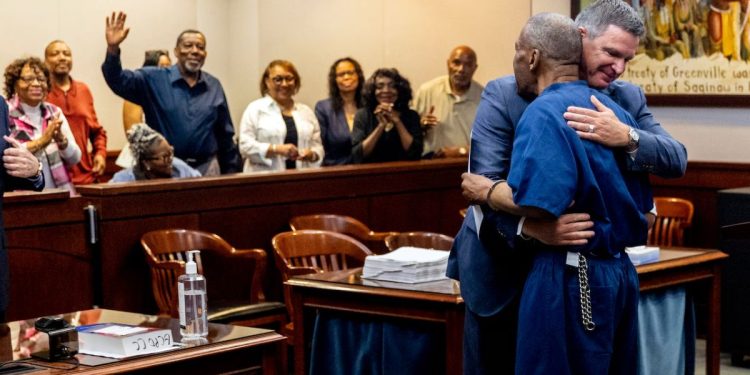Moments after learning that his 52-year incarceration was coming to an end, Horace Peterson looked into the courtroom gallery, smiled, and waved to his 11-year-old great-grandson.
Peterson expressed his gratitude to the court for reuniting him with his family, who had tirelessly fought for his release, arguing that he was merely misplaced.
Genesee County Prosecutor David Leyton and defense counsel Michael Manley signed a combined petition asking the court to overturn Peterson’s previous conviction.
He was convicted of first-degree murder.
Peterson, 72, went to a Flint music store with his friend Nathaniel Porter in 1973.
During an attempted heist, Porter shot and killed 20-year-old employee Laurie Snyder.
Porter, who changed his identity to Nathaniel Owusu, claimed in a November 2020 letter to Peterson’s family that Peterson was not participating in the crime and that the killing was unintentional.
His conviction came just a few years before the Michigan Supreme Court declared that charging someone with first-degree murder without proof of malice or intent was unconstitutional.
While Peterson’s family continued to campaign for his release, the Michigan Supreme Court declared in April that 19- and 20-year-olds who commit first-degree murder cannot be sentenced to life in prison.
That cleared the way for Peterson to be released.
Prosecutors and attorneys collaborated on a plea deal that would allow Peterson to be released immediately.
They requested Genesee County Circuit Court Judge Brian S. Pickell to overturn Peterson’s previous conviction and entertain a no contest plea to second-degree murder with a minimum sentence of 25 and a maximum term of 40 years with credit for time served.
“He paid a high price for being in the wrong place at the wrong time,” Peterson’s attorney, Michael Manley, told the court at a resentencing hearing in front of Pickell on Tuesday, May 13. “… He just wants to go home to his family.”
Peterson is now eligible for immediate release from Michigan’s Department of Correction.
He became eligible for parole one day before his daughter Onquette Woodyard’s 55th birthday.
She believes that bringing her father home is the best birthday gift she can give.
“We did it,” Onquette informed the assembled journalists.
Onquette and her son, Eric Woodyard, worked relentlessly to secure Peterson’s release.
They collaborated with a New York-based filmmaker to produce a documentary about his story.
Leyton relayed the account of Eric, a former MLive-The Flint Journal writer, who came to his office to inform him of Peterson’s story.
The prosecutor stated that after speaking with Eric and Owusu, he was confident it was “time for Mr. Peterson to come home.”
Peterson told those assembled in the courtroom that he never stops thinking about and praying for Laurie Snyder, the victim of the 1973 shooting.
“I have a very passionate heart for Laurie,” Peterson explained. “… I wish her family the absolute best.”
The courtroom was packed with loving family members ready to reunite with Peterson, who they had supported during his sentence.
Ethan Woodyard, 11, shared a moment with his great-grandfather right after the hearing ended.
Peterson turned, smiled, and waved to Ethan, who expressed his want to spend time with him after his release.
“I just want to send him love,” Ethan explained. “It felt good just to see everybody joyful and to see him joyful—it just means a lot to me.”









